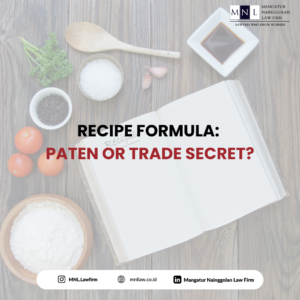
To determine whether a Recipe Formula is protected by a Patent or a Trade Secret, first understand the definitions and provisions of Patents and Trade Secrets.
PATENT
A patent is an exclusive right granted by the State to an inventor for their invention in the field of technology for a certain period of time, allowing them to independently execute the invention or give permission to others to do so.
What are an Inventor and an Invention?
An invention is the idea of an inventor that is embodied in an activity that solves a specific problem in the field of technology, in the form of a product or process, or an improvement and development of a product or process. An inventor is someone or a group of people who jointly implement the idea into activities that result in an invention.
The scope of patent protection includes Patents and Simple Patents. Patent protection is granted for inventions that are new, involve an inventive step, and are industrially applicable. Simple Patent protection is granted for new inventions that are developments of existing products or processes and are industrially applicable.
A patent is granted based on an application made by the applicant or their representative to the Directorate General of Intellectual Property (“DGIP”) in writing in Indonesian and upon payment of a fee. Patent protection is given if the invention applied for is not the same as an invention that has previously been disclosed, either in Indonesia or outside Indonesia, or an invention that has already been registered, as stipulated in Article 5 of Law No. 13 of 2016 on Patents (“Patent Law”) and the First to File principle adopted by Indonesia.
Patent protection is only granted for a period of 20 (twenty) years from the filing date. Simple Patent protection is granted for a period of 10 (ten) years from the filing date. The duration of protection for both patents and simple patents cannot be extended, meaning that after this period, an invention becomes public domain, allowing others to use, produce, or sell the invention freely.
TRADE SECRET
The definition of a trade secret is found in Article 1 point 1 of Law No. 30 of 2000 (“Trade Secret Law”), which states that a trade secret is information that is not known to the public in the field of technology and/or business, has economic value because it is useful in business activities, and is kept confidential by the owner of the trade secret.
The scope of trade secret protection includes production methods, processing methods, sales methods, or other information in the field of technology and/or business that has economic value and is not known to the public. Trade secrets receive protection if the information:
- Confidential, meaning the information is only known to certain parties or is not generally known by the public;
- Has economic value, meaning the confidentiality of the information can be used to conduct activities or businesses that are commercial in nature/can increase economic profit;
- Efforts have been made by the owner or parties who control the Trade Secret to maintain its confidentiality (for example, by making confidentiality agreements with parties who are given access to the confidential information).
Trade Secret protection does not require registration; it is based on the existence of a confidentiality agreement between the Trade Secret owner and employees or licensees. Thus, the confidential information is protected as a Trade Secret and this protection has no time limit. However, if the Trade Secret owner grants a license or transfers their rights to another party, the license or transfer agreement must be registered with the DGIP to obtain legal protection, as stipulated in Article 8 of the Trade Secret Law.
Although Trade Secrets are not required to be registered to obtain legal protection, if there is use or disclosure of Trade Secrets to unauthorized parties for commercial purposes or if a Trade Secret infringement is suspected, the Trade Secret owner or licensee can take legal action, both criminal and civil, as stipulated in Articles 11 and 17 of the Trade Secret Law.
Article 11 of the Trade Secret Law
- The holder of Trade Secret rights or the licensee can sue anyone who intentionally and without authorization commits the acts referred to in Article 4, in the form of:
a. claim for damages; and/or
b. the cessation of all acts as referred to in Article 4. - The lawsuit referred to in paragraph (1) is filed with the District Court.
Article 17 of the Trade Secret Law
- Anyone who intentionally and without authorization uses another party’s Trade Secret or commits the acts referred to in Article 13 or Article 14 shall be punished with imprisonment for a maximum of 2 (two) years and/or a fine of up to Rp.300,000,000.00 (three hundred million rupiahs).
- The criminal act referred to in paragraph (1) is a delict complaint.
Based on the above description, for a Recipe Formula that remains confidential, has economic value, and has efforts made to maintain its confidentiality, it is best protected through the mechanism of a Trade Secret. This is particularly true if the owner or inventor of the Recipe Formula wishes to retain it indefinitely (without a time limit) and does not want to publicize the Recipe Formula to the general public.
If you require Legal Consultation, you can contact us through:
Email: Secretary@mnllaw.co.id
Phone: 0812 9539 7825 / 0813 98941976
